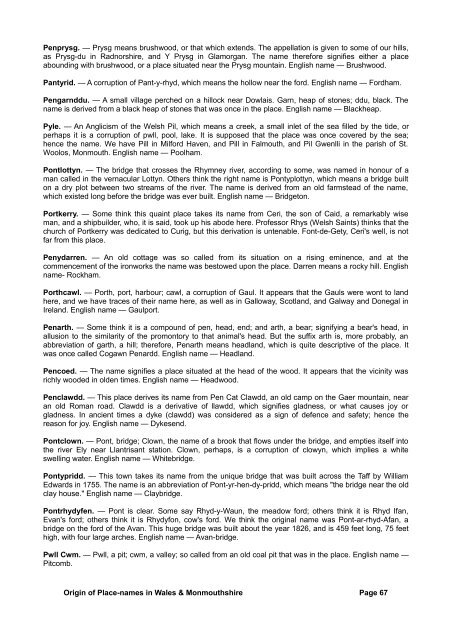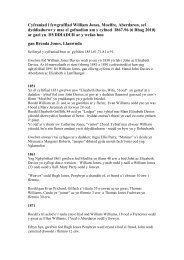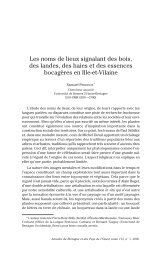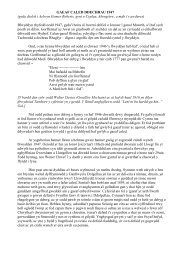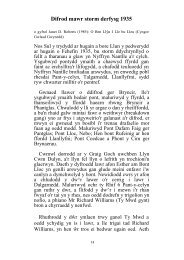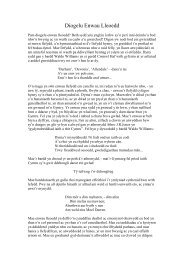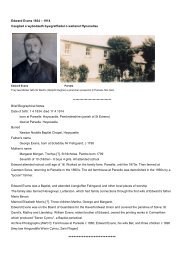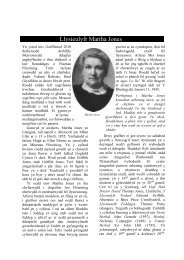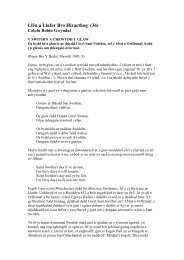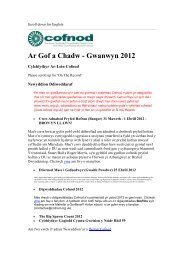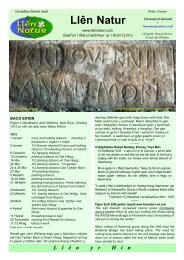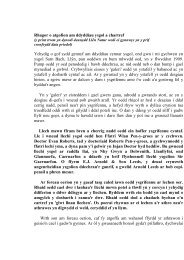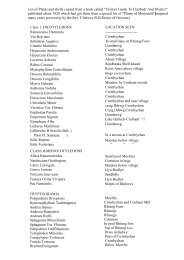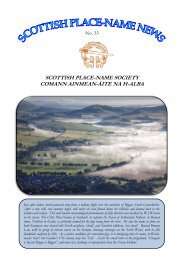Penprysg. — Prysg means brushwood, or that which extends. The appellation is given to some <strong>of</strong> our hills,as Prysg-du <strong>in</strong> Radnorshire, <strong>and</strong> Y Prysg <strong>in</strong> Glamorgan. The name <strong>the</strong>refore signifies ei<strong>the</strong>r a <strong>place</strong>abound<strong>in</strong>g with brushwood, or a <strong>place</strong> situated near <strong>the</strong> Prysg mounta<strong>in</strong>. English name — Brushwood.Pantyrid. — A corruption <strong>of</strong> Pant-y-rhyd, which means <strong>the</strong> hollow near <strong>the</strong> ford. English name — Fordham.Pengarnddu. — A small village perched on a hillock near Dowlais. Garn, heap <strong>of</strong> stones; ddu, black. Thename is derived from a black heap <strong>of</strong> stones that was once <strong>in</strong> <strong>the</strong> <strong>place</strong>. English name — Blackheap.Pyle. — An Anglicism <strong>of</strong> <strong>the</strong> Welsh Pil, which means a creek, a small <strong>in</strong>let <strong>of</strong> <strong>the</strong> sea filled by <strong>the</strong> tide, orperhaps it is a corruption <strong>of</strong> pwll, pool, lake. It is supposed that <strong>the</strong> <strong>place</strong> was once covered by <strong>the</strong> sea;hence <strong>the</strong> name. We have Pill <strong>in</strong> Milford Haven, <strong>and</strong> Pill <strong>in</strong> Falmouth, <strong>and</strong> Pil Gwenlli <strong>in</strong> <strong>the</strong> parish <strong>of</strong> St.Woolos, Monmouth. English name — Poolham.Pontlottyn. — The bridge that crosses <strong>the</strong> Rhymney river, accord<strong>in</strong>g to some, was named <strong>in</strong> honour <strong>of</strong> aman called <strong>in</strong> <strong>the</strong> vernacular Lottyn. O<strong>the</strong>rs th<strong>in</strong>k <strong>the</strong> right name is Pontyplottyn, which means a bridge builton a dry plot between two streams <strong>of</strong> <strong>the</strong> river. The name is derived from an old farmstead <strong>of</strong> <strong>the</strong> name,which existed long before <strong>the</strong> bridge was ever built. English name — Bridgeton.Portkerry. — Some th<strong>in</strong>k this qua<strong>in</strong>t <strong>place</strong> takes its name from Ceri, <strong>the</strong> son <strong>of</strong> Caid, a remarkably wiseman, <strong>and</strong> a shipbuilder, who, it is said, took up his abode here. Pr<strong>of</strong>essor Rhys (Welsh Sa<strong>in</strong>ts) th<strong>in</strong>ks that <strong>the</strong>church <strong>of</strong> Portkerry was dedicated to Curig, but this derivation is untenable. Font-de-Gety, Ceri's well, is notfar from this <strong>place</strong>.Penydarren. — An old cottage was so called from its situation on a ris<strong>in</strong>g em<strong>in</strong>ence, <strong>and</strong> at <strong>the</strong>commencement <strong>of</strong> <strong>the</strong> ironworks <strong>the</strong> name was bestowed upon <strong>the</strong> <strong>place</strong>. Darren means a rocky hill. Englishname- Rockham.Porthcawl. — Porth, port, harbour; cawl, a corruption <strong>of</strong> Gaul. It appears that <strong>the</strong> Gauls were wont to l<strong>and</strong>here, <strong>and</strong> we have traces <strong>of</strong> <strong>the</strong>ir name here, as well as <strong>in</strong> Galloway, Scotl<strong>and</strong>, <strong>and</strong> Galway <strong>and</strong> Donegal <strong>in</strong>Irel<strong>and</strong>. English name — Gaulport.Penarth. — Some th<strong>in</strong>k it is a compound <strong>of</strong> pen, head, end; <strong>and</strong> arth, a bear; signify<strong>in</strong>g a bear's head, <strong>in</strong>allusion to <strong>the</strong> similarity <strong>of</strong> <strong>the</strong> promontory to that animal's head. But <strong>the</strong> suffix arth is, more probably, anabbreviation <strong>of</strong> garth, a hill; <strong>the</strong>refore, Penarth means headl<strong>and</strong>, which is quite descriptive <strong>of</strong> <strong>the</strong> <strong>place</strong>. Itwas once called Cogawn Penardd. English name — Headl<strong>and</strong>.Pencoed. — The name signifies a <strong>place</strong> situated at <strong>the</strong> head <strong>of</strong> <strong>the</strong> wood. It appears that <strong>the</strong> vic<strong>in</strong>ity wasrichly wooded <strong>in</strong> olden times. English name — Headwood.Penclawdd. — This <strong>place</strong> derives its name from Pen Cat Clawdd, an old camp on <strong>the</strong> Gaer mounta<strong>in</strong>, nearan old Roman road. Clawdd is a derivative <strong>of</strong> llawdd, which signifies gladness, or what causes joy orgladness. In ancient times a dyke (clawdd) was considered as a sign <strong>of</strong> defence <strong>and</strong> safety; hence <strong>the</strong>reason for joy. English name — Dykesend.Pontclown. — Pont, bridge; Clown, <strong>the</strong> name <strong>of</strong> a brook that flows under <strong>the</strong> bridge, <strong>and</strong> empties itself <strong>in</strong>to<strong>the</strong> river Ely near Llantrisant station. Clown, perhaps, is a corruption <strong>of</strong> clowyn, which implies a whiteswell<strong>in</strong>g water. English name — Whitebridge.Pontypridd. — This town takes its name from <strong>the</strong> unique bridge that was built across <strong>the</strong> Taff by WilliamEdwards <strong>in</strong> 1755. The name is an abbreviation <strong>of</strong> Pont-yr-hen-dy-pridd, which means "<strong>the</strong> bridge near <strong>the</strong> oldclay house." English name — Claybridge.Pontrhydyfen. — Pont is clear. Some say Rhyd-y-Waun, <strong>the</strong> meadow ford; o<strong>the</strong>rs th<strong>in</strong>k it is Rhyd Ifan,Evan's ford; o<strong>the</strong>rs th<strong>in</strong>k it is Rhydyfon, cow's ford. We th<strong>in</strong>k <strong>the</strong> <strong>orig<strong>in</strong></strong>al name was Pont-ar-rhyd-Afan, abridge on <strong>the</strong> ford <strong>of</strong> <strong>the</strong> Avan. This huge bridge was built about <strong>the</strong> year 1826, <strong>and</strong> is 459 feet long, 75 feethigh, with four large arches. English name — Avan-bridge.Pwll Cwm. — Pwll, a pit; cwm, a valley; so called from an old coal pit that was <strong>in</strong> <strong>the</strong> <strong>place</strong>. English name —Pitcomb.Orig<strong>in</strong> <strong>of</strong> Place-<strong>names</strong> <strong>in</strong> Wales & Monmouthshire Page 67
Port Talbot. — So called <strong>in</strong> 1835 <strong>in</strong> honour <strong>of</strong> C. R. M. Talbot, Esq., M.P., Margam Park, who is <strong>the</strong> soleproprietor <strong>of</strong> <strong>the</strong> harbour. The name is now be<strong>in</strong>g applied to <strong>the</strong> whole district.Port Tennant. — So named <strong>in</strong> honour <strong>of</strong> H. T. Tennant, Esq., Cadoxton Lodge, who constructed it at his ownexpense <strong>in</strong> 1826.Penmaen. — The name signifies " <strong>the</strong> head <strong>of</strong> <strong>the</strong> rock or stone," from <strong>the</strong> situation <strong>of</strong> <strong>the</strong> <strong>place</strong> at <strong>the</strong>extremity <strong>of</strong> a ridge <strong>of</strong> rocks overlook<strong>in</strong>g Oxwich Bay. English name — Rocksend.Peterston-super-Montem. — A translation <strong>of</strong> <strong>the</strong> Welsh Llanbedr-ar-Fynydd. The church was probablydedicated to Peter le Sorre, <strong>and</strong> is situated on <strong>the</strong> mounta<strong>in</strong>.Peterston-super-Ely. — The church was probably dedicated to Peter le Sorre, <strong>and</strong> is situated on <strong>the</strong> riverEly.Pontlliw. — Pont, bridge; Lliw, <strong>the</strong> name <strong>of</strong> <strong>the</strong> rivulet that flows under <strong>the</strong> bridge, <strong>and</strong> hastens to dischargeitself <strong>in</strong>to <strong>the</strong> Loughor river. English name — Huebridge.Pontardulais. — The name means a bridge on <strong>the</strong> Dulais. English name — Dulais Bridge.Pontygwaith. — Gwaith means work. It appears that <strong>the</strong>re was an ironworks here once, <strong>and</strong> a smelt<strong>in</strong>gfurnace was seen here as late as <strong>the</strong> year 1850. A bridge was probably built near <strong>the</strong> works; hence <strong>the</strong>name. — English name — Workbridge.Penrhiwceiber. — Penrhiw, head <strong>of</strong> <strong>the</strong> slope; cciber-ceibr is probably ei<strong>the</strong>r a contraction <strong>of</strong> ceu bren fhollow tree; or <strong>of</strong> ceibren, rafter, joist. Ceibren is sometimes spelt cebr, <strong>the</strong> plural <strong>of</strong> which is ceibr or ceibrau.English name — Woodhill.Pantywaun. — Pant, hollow; y, <strong>the</strong>; waun, mounta<strong>in</strong> meadow. The <strong>place</strong>, as <strong>the</strong> name signifies, is situatedon a low, isolated spot on a mounta<strong>in</strong> meadow. English name — D<strong>in</strong>glemoor.Penwaun. — The name signifies <strong>the</strong> head or end <strong>of</strong> <strong>the</strong> moor or meadow. The small village lies <strong>in</strong> <strong>the</strong> upperpart <strong>of</strong> <strong>the</strong> Aberdare valley, <strong>and</strong>, like Hirwaun, derives its name from Gwrgant's meadow. English name —Moorsend.Quaker's Yard. — Lydia Fell, a wealthy member <strong>of</strong> <strong>the</strong> Quaker fraternity, was <strong>the</strong> owner <strong>of</strong> <strong>the</strong> nor<strong>the</strong>rnportion <strong>of</strong> <strong>the</strong> Llanfab<strong>of</strong>t estate, <strong>and</strong>, when a burial- <strong>place</strong> for <strong>the</strong> Quakers became a desideratum, she gavea piece <strong>of</strong> l<strong>and</strong> tor <strong>the</strong> purpose, which was made a suitable repository for <strong>the</strong> dead about <strong>the</strong> year 1670 or1680. The village takes its name from this ancient burial-<strong>place</strong>.Rudry. — A corruption <strong>of</strong> Rhydri or Rhuddry, Some th<strong>in</strong>k <strong>the</strong> <strong>orig<strong>in</strong></strong>al name wysyryw dre f <strong>the</strong> home <strong>of</strong> yewtrees, from <strong>the</strong> abundance <strong>of</strong> yew trees <strong>in</strong> <strong>the</strong> neighbourhood. English name — Yewham.Rhydyboithan. — Rhyd, ford; boithan, a corruption <strong>of</strong> bydd<strong>in</strong>, an army. Ano<strong>the</strong>r attempt: Boithan is acorruption, perhaps, <strong>of</strong> bwthyn, a cottage; <strong>the</strong> name signify<strong>in</strong>g <strong>the</strong> ford near <strong>the</strong> cottage. English name —Armyford.Rhosily. — The right word<strong>in</strong>g is Rhos Sulwy. Rhos means a dry meadow, a pla<strong>in</strong>, which was given byFitzhamon to Reg<strong>in</strong>ald de Sulwy; hence <strong>the</strong> name. Sily is a corruption <strong>of</strong> Sulwy. English name — Sulton.Radir. — A small parish <strong>in</strong> which <strong>the</strong> waters <strong>of</strong> <strong>the</strong> Taff form a cataract. Rhaiadr is <strong>the</strong> Welsh for cataract orwaterfall, <strong>and</strong> Radir, accord<strong>in</strong>g to some, is a corruption <strong>the</strong>re<strong>of</strong>. We ra<strong>the</strong>r th<strong>in</strong>k it is a contraction <strong>of</strong> yr dr dir,<strong>the</strong> arable l<strong>and</strong>. Bar, <strong>the</strong> root <strong>of</strong> bara, bread, signifies what grows from arable l<strong>and</strong>. English name — Tillton.Rhydfelen. — The right word<strong>in</strong>g is Rhydyfel<strong>in</strong>, signify<strong>in</strong>g <strong>the</strong> ford <strong>of</strong> <strong>the</strong> mill. English name — Millford.Raven Hill. — The village was once called Fforest Fach, from its situation near a forest. Raven puzzles us.Perhaps from Nraefn, a raven, <strong>the</strong> Danish st<strong>and</strong>ard, <strong>in</strong>dicat<strong>in</strong>g <strong>the</strong> <strong>place</strong> as <strong>the</strong> abode <strong>of</strong> a Dane. There is afarm <strong>in</strong> <strong>the</strong> vic<strong>in</strong>ity called Penile 'rbra<strong>in</strong>, which signifies <strong>the</strong> chief rendezvous <strong>of</strong> <strong>the</strong> raven tribe <strong>in</strong> <strong>the</strong> district,<strong>and</strong> <strong>the</strong> present name is, doubtless, a translation <strong>of</strong> <strong>the</strong> same.Orig<strong>in</strong> <strong>of</strong> Place-<strong>names</strong> <strong>in</strong> Wales & Monmouthshire Page 68
- Page 1 and 2:
HANDBOOK OF THE ORIGIN OF PLACE-NAM
- Page 3 and 4:
§ § § § §The Author begs to st
- Page 5 and 6:
pitiful cries of the railway offici
- Page 7 and 8:
Bishop Percy says that "in England,
- Page 9 and 10:
The city of Chester is still popula
- Page 11 and 12:
There's Cumwhitton, Cumwhinton, Cum
- Page 13 and 14:
Llwyn in its primary' sense means a
- Page 15 and 16:
PLACE-NAMES IN WALES.Wales. — The
- Page 17 and 18:
Church are generally dedicated to e
- Page 19 and 20: think he was a contemporary of St.
- Page 21 and 22: Rhosbeirio. — Rhos, a moor, a dry
- Page 23 and 24: of Brecknock," states that this vic
- Page 25 and 26: Cam cnwir ef Cwmdu,Cwm gwyn yw & n
- Page 27 and 28: Penderyn. — A corruption probably
- Page 29 and 30: Ardudwy. — Ar, upon or above; tud
- Page 31 and 32: to mark its pre-eminence over the o
- Page 33 and 34: Some think that eirw is a corruptio
- Page 35 and 36: present form — Caerfyrddin.Abergw
- Page 37 and 38: place of refuge; hence the name. En
- Page 39 and 40: Llansawyl. — The church was dedic
- Page 41 and 42: eject. The village took its name fr
- Page 43 and 44: house, and attempted to kill an inf
- Page 45 and 46: Gwydir. — Prima facie one may tak
- Page 47 and 48: Nefyn. — The church was probably
- Page 49 and 50: DENBIGHSHIRE.Anglicized form of Din
- Page 51 and 52: Llangollen. — From Collen, a sain
- Page 53 and 54: hands into their pockets to pay a c
- Page 55 and 56: Cefn. — The name signifies a ridg
- Page 57 and 58: Maesgarmon. — Named in honour of
- Page 59 and 60: Abertridwr. — Tridwr, three water
- Page 61 and 62: it is said, was originally built by
- Page 63 and 64: Cwmllynfell. — Cwm, a narrow vale
- Page 65 and 66: Gwarycaeau. — Gwdr, the nape of t
- Page 67 and 68: means a cultivated region, a vale,
- Page 69: Penrhiwfer.- Pen, head, top; rhiw,
- Page 73 and 74: Trealaw. — This appellation was g
- Page 75 and 76: Aberdyfi. — So called from its si
- Page 77 and 78: Llanddwywe. — From Dwywau, a desc
- Page 79 and 80: Crickhowell and some in the directi
- Page 81 and 82: Griffithstown. — This village was
- Page 83 and 84: and gwy, water. Treiddiod troth tna
- Page 85 and 86: derive Tintern from din, fortified
- Page 87 and 88: Caersws. — It appears that the Ro
- Page 89 and 90: English name — Ervylton.Llanymech
- Page 91 and 92: Angle. — Probably from the angle-
- Page 93 and 94: Gellyswick. — Another hybrid. Gel
- Page 95 and 96: that the two rivers in their flowin
- Page 97 and 98: ecame the bishop of the see, and wa
- Page 99 and 100: earth formerly stood on a summit on
- Page 101 and 102: Pilleth. — A corruption of pwll,
- Page 103 and 104: Howells, Rev. J., Mountain AshHowel
- Page 105 and 106: Williams, D., PenywernWilliams, Rev


